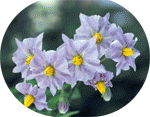| Abstract Detail
Breeding and Genetics Reddivari, L. [1], Vanamala, J. [2], Stephen, S.H. [3], Miller Jr., J.C. [1]. Specialty potato (Solanum tuberosum L.) functional compounds and fractions suppress LNCaP and PC3 cell proliferation. POLYPHENOLS, a group of bioactive plant compounds, have been associated with decreased risk of developing chronic diseases such as cancer. Three fractions (water, ethyl acetate, methanol) and seven compounds (chlorogenic acid, caffeic acid, gallic acid, catechin, malvidin, solanine, chaconine) from specialty potatoes rich in polyphenols were evaluated for their antioxidant and antiproliferative activities against human prostate cancer cell lines, using the DPPH (2,2-Diphenyl-1-picrylhydrazyl) and WST (4-(3-(4-iodophenyl)-2-(4-nitrophenyl)-2H-5-tetrazolio)-1,3-benzene disulfonate) assays, respectively. The methanol fraction contributed approximately 60% to the antioxidant activity and had significantly higher antiproliferative effects compared to the water and ethyl acetate fractions in both LNCap and PC3 cancer cell lines. This fraction decreased the percentage of LNCaP cells in S phase by 9.1% and increased the cells in G0/G1 by 10.4% as determined by FACS (fluorescence activated cell sorting) analysis. The methanol fraction caused a concentration-dependent decrease (0-10 μg/ml) in cancer cell proliferation, and this was not reversed by N-acetylcysteine, indicating that the inhibition of cell growth was not due to oxidant generation in the tested cell lines. Western blot analysis indicated that the methanol fraction did not affect the p21 and p27 protein levels. Among the compounds tested, gallic acid had the highest antioxidant activity. Chaconine had the lowest IC50 value (5 μg/ml) for cell growth inhibition. Individual potato polyphenols differed in their effectiveness as antiproliferative agents. Glycoalkaloids had significantly higher antiproliferative activity than phenolic acids and anthocyanins in LNCap and PC3 cells.
Log in to add this item to your schedule
1 - Texas A&M University, Horticultural Sciences, College Station, TX, 77843, USA
2 - Texas A&M University, Nutrition and Food Science, College Station, TX, 77843, USA
3 - Texas A&M University, Veterinary Physiology & Pharmacology, College Station, TX, 77843-4466
Keywords:
antioxidants
Potato
prostate cancer cells
FACS.
Session: PAA08-1
Location: Hall of Ideas Room G/Monona Terrace
Date: Tuesday, July 25th, 2006
Time: 8:30 AM
Abstract ID:251 |
